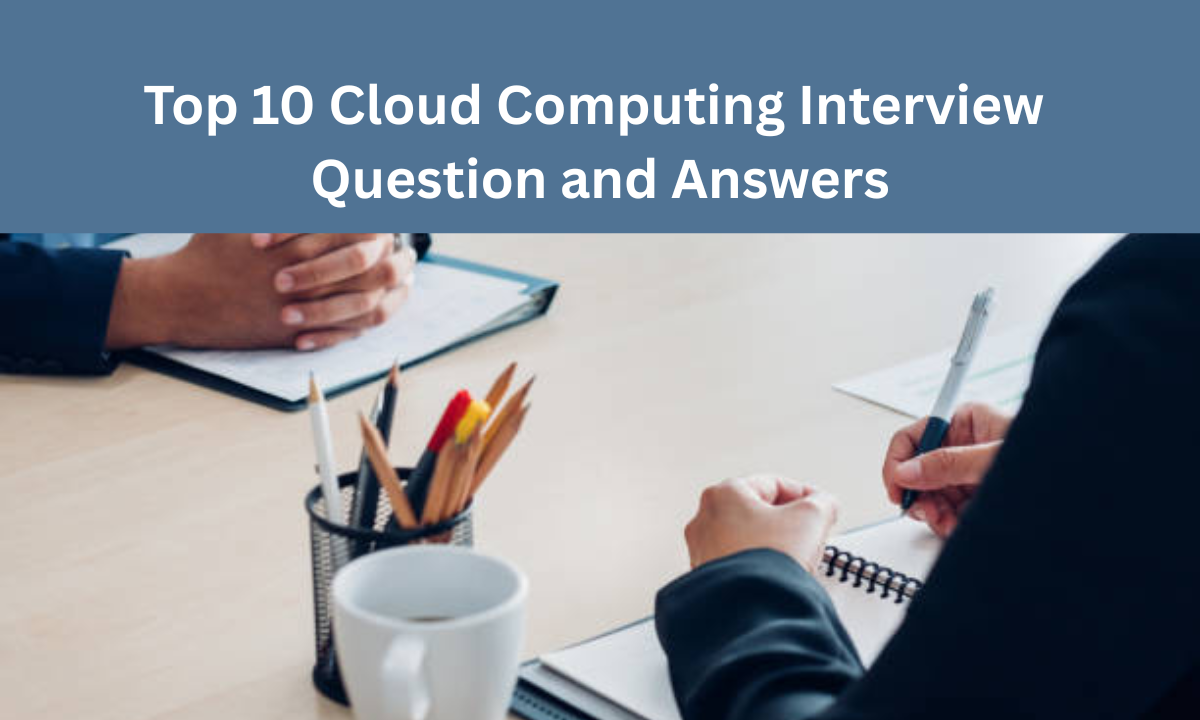Table of contents
|
1. Here, we cover the Top 10 Cloud Computing Interview Questions and Answers, selected to help you ace your next job interview.
|
|
2. Tips to Ace a Cloud Computing Interview |
|
3. Mastering the Cloud with the Right Training |
|
4. Conclusion: Why Apponix is the Right Choice |
In the modern digital era, cloud computing has become the foundation for scalable, flexible, and cost-effective technology solutions. Organizations across the globe are rapidly migrating to cloud platforms to enhance their infrastructure, increase efficiency, and reduce operational costs. As a result, there is a surge in demand for skilled professionals with a strong grasp of cloud fundamentals.
For individuals looking to begin or advance their careers in cloud technology, mastering the top cloud computing interview questions is essential. Whether you're a fresher or an experienced professional, understanding the core principles, architecture, service models, and deployment strategies of cloud computing is vital to performing well in interviews.
Here, we cover the Top 10 Cloud Computing Interview Questions and Answers, selected to help you ace your next job interview.
1. What is Cloud Computing?
Cloud computing refers to the delivery of various services such as servers, storage, databases, networking, software, and analytics over the internet. It allows users to access and store data and applications on remote servers instead of a local system, making resources available on demand and ensuring scalability.
2. What are the Main Cloud Computing Service Models?
The three primary cloud computing service models are:
Infrastructure as a Service (IaaS): Offers virtualized computing resources like servers and storage over the internet.
Platform as a Service (PaaS): Provides a platform allowing developers to build, test, and deploy applications.
Software as a Service (SaaS): Delivers software applications over the internet on a subscription basis.
3. What are the Different Cloud Deployment Models?
There are four major deployment models in cloud computing:
Public Cloud: Services offered over the public internet and available to anyone.
Private Cloud: Services are maintained on a private network, offering more control and security.
Hybrid Cloud: Combines both public and private clouds for better flexibility.
Community Cloud: Shared infrastructure between several organizations with common concerns.
4. What is Virtualization in Cloud Computing?
Virtualization is the technology that allows multiple virtual machines to run on a single physical machine using a hypervisor. It plays a critical role in cloud computing by enabling resource sharing and efficient utilization of hardware resources.
5. What is the Difference Between Cloud Computing and Traditional Computing?
Cloud computing is on-demand, scalable, and subscription-based, requiring minimal upfront costs. Traditional computing relies on physical hardware and infrastructure, which is expensive to set up and maintain. Cloud computing also allows for remote access, while traditional computing typically requires on-site access.
6. What is an API Gateway in Cloud Environments?
An API Gateway acts as a central point for managing and routing requests to microservices in a cloud architecture. It provides functionalities such as load balancing, rate limiting, and security enforcement, which are crucial in distributed systems.
7. What is Load Balancing in Cloud Computing?
Load balancing is the process of distributing workloads across multiple computing resources to ensure no single system becomes overwhelmed. It improves performance, maximizes resource utilization, and ensures system reliability and uptime.
8. What is the Difference Between Edge Computing and Cloud Computing?
While cloud computing processes data in centralized data centres, edge computing brings processing closer to the data source. This helps reduce latency and is ideal for time-sensitive applications, such as IoT devices and real-time analytics.
9. What is the Role of Containers in Cloud Computing?
Containers allow developers to package applications along with their dependencies into a single unit. They provide portability, faster deployment, and consistency across various environments. Tools like Docker and Kubernetes are widely used for container orchestration in cloud environments.
10. What is Multi-Tenancy in Cloud Computing?
Multi-tenancy refers to a single instance of software serving multiple customers or "tenants." Although tenants share computing resources, their data is isolated and secure. This architecture optimizes resource usage and reduces operational costs.
Tips to Ace a Cloud Computing Interview
Understand the core concepts such as service models (IaaS, PaaS, SaaS) and deployment types (public, private, hybrid).
Learn about virtualization, networking, containers, and orchestration tools like Docker and Kubernetes.
Get hands-on with platforms such as AWS, Azure, or Google Cloud.
Practice explaining complex topics in simple terms.
Mastering the Cloud with the Right Training
To confidently answer cloud computing interview questions, it's crucial to gain real-world exposure through practical training. Professionals who enroll in a well-structured Cloud Computing course often report a better understanding of cloud fundamentals, hands-on experience with tools, and a strong advantage during interviews.
The tech ecosystem in Bangalore, often dubbed India’s Silicon Valley, provides immense opportunities for cloud professionals. As organizations transition to cloud infrastructure, skilled talent is in high demand.
Conclusion: Why Apponix is the Right Choice
Apponix Technologies stands out as a premier IT training institute, especially for those looking to advance their careers in cloud computing. Their Cloud Computing course in Bangalore is tailored to meet industry standards, offering hands-on labs, live projects, and expert mentorship. Students learn everything from basic cloud concepts to advanced tools and deployment practices, preparing them for real-world challenges and job interviews.
Apponix not only equips students with technical skills but also supports them through placement assistance and career counseling, ensuring they’re interview-ready. Whether you're starting from scratch or upskilling for a promotion, Apponix provides the guidance and resources necessary to succeed.
Master the most asked cloud computing interview questions and elevate your career trajectory by enrolling in Apponix's comprehensive cloud program today.





